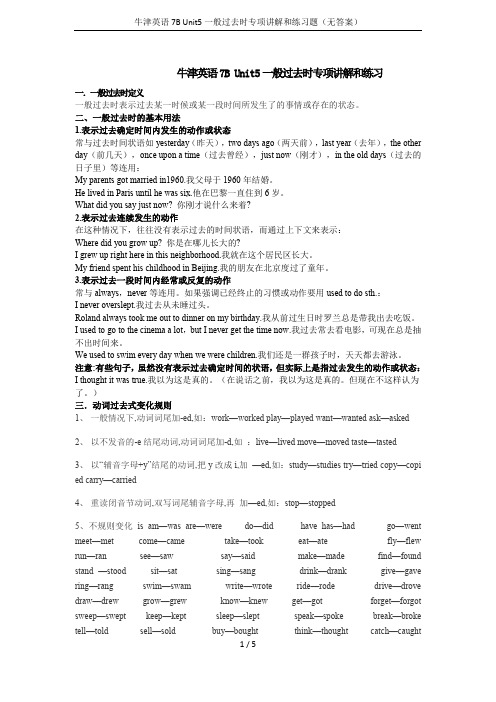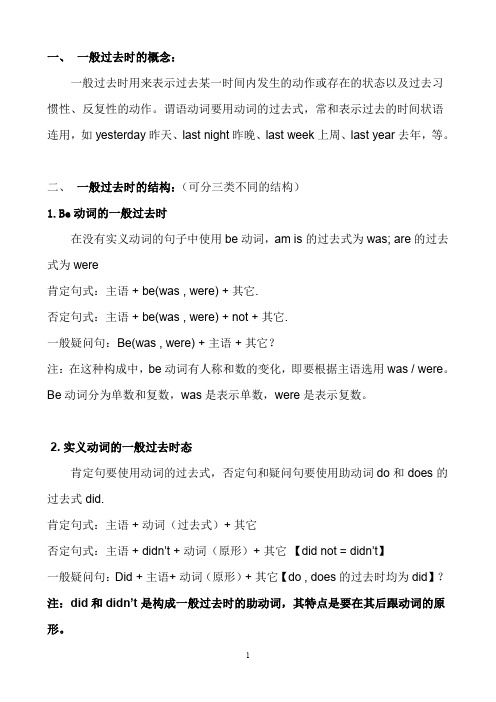7B一般过去式
- 格式:ppt
- 大小:267.50 KB
- 文档页数:23

牛津译林-7B U n i t5-一般过去时-专题教案设计+练习-(含答案)一般过去时 专题练【Grammar points 】Ⅰ. 基本概念➢ 【概念】一般过去时:表示过去的动作或状态,这种动作或状态可以是过去某个时间发生的,也可以是过去一段时间内经常性或习惯性的动作。
【例】Mother felt ill last week . 妈妈上周觉得身体不适。
Simon was unhappy yesterday . 西蒙昨天不开心。
过去经常 Heoften helped me with my English last term . 他上学期经常帮我辅导英语。
I wrote to my parents once a week at college . 上大学时我每周给父母写一封信。
➢ 【句式结构】● 主语 + was/were + 其他【例】He was a teacher three years ago . 他三年前是一名老师。
● 主语 + 动词过去式(did ) + 其他【例】Yesterday Tom asked me a question. 昨天汤姆问了我一个问题。
➢【动词过去式变化规则】一般过去时用动词的过去式构成。
动词过去式的构成分规则变化和不规则变化两种形式,不规则变化通常需要逐个记忆,规则变化则遵循以下原则:➢【动词过去式-ed发音规则】●动词词尾为"t、d”时,发/id/音:want→wanted、need→needed●动词词尾为清辅音时,发/t/音:help→helped、laugh→laughed、look→looked、kiss→kissed、wash→washed、watch→watched●动词词尾为t、d以外之浊辅音或元音时,发/d/音:call→called、stay→stayed ➢【部分不规则动词过去式归纳】Ⅱ. 基本用法➢【时间状语】●常见标志词:yesterday,the day before yesterday,the other day● last短语:last night / week / month / term / trip●时间词 + ago:three days ago,few days ago,a moment ago●介词+ 过去的时间词:in 2010,during last month,in the old days,in the past●其他标志词:just now, at that time, in those days, once upon a time等。

(译林版)7B-Unit6语法知识点本文档旨在总结和介绍(译林版)7B课本第六单元的语法知识点。
以下是该单元的主要语法知识点:1.一般现在时:表示经常性、惯性或客观事实的动作或状态。
例如:I often play football on weekends.(我经常在周末踢足球。
)2.一般过去时:表示过去发生的动作或状态。
例如:She visited her grandparents last summer.(她去年夏天拜访了她的祖父母。
)3.一般将来时:表示将来要发生或打算要发生的动作或状态。
例如:They will go to the park tomorrow.(他们明天会去公园。
)4.现在进行时:表示现在正在进行的动作。
例如:I am studying for the exam.(我正在为考试而研究。
)5.过去进行时:表示过去某个时间点正在进行的动作。
例如:She was studying when I called her.(我给她打电话时,她正在研究。
)6.将来进行时:表示将来某个时间点正在进行的动作。
例如:They will be playing basketball at 5 o'clock tomorrow.(他们明天五点钟将正在打篮球。
)7.现在完成时:表示过去某个时间点开始的动作一直持续到现在。
例如:I have known him for 10 years.(我认识他已经有十年了。
)8.过去完成时:表示过去某个时间点之前已经完成的动作。
例如:She had finished her homework before dinner.(她在晚饭前已经完成了她的作业。
)9.情态动词:用来表示可能性、能力、推测等情态。
例如:You should study harder.(你应该更加努力研究。
)以上是(译林版)7B课本第六单元的主要语法知识点。
希望对学生们的学习有所帮助。


牛津英语7B Unit6知识点梳理及拓展1. outdoor fun户外趣事(1).同义词为outside(外部的) 反义词indoor室内的[拓展]outdoor常构成固定短语:outdoor activities 室外活动outdoor life 野外生活outdoor exercises 户外运动(2).fun 的短语:have fun doing sth. tell funny jokes2. Hurry up, Eddie.赶快,埃迪。
考点:掌握hurry作名词与动词在句中的转换。
hurry 此处用作不及物动词,意为“匆忙;急忙”。
其过去式为hurried。
(1)"hurry to+地点”意为“急忙去某地”,(2)hurry to do sth.=do sth in a hurry意为“匆忙做某事”[拓展] hurry也可用作名词,意为“匆忙;急忙”in a hurry匆忙,急忙;in no hurry 不用着急,慢点3. complain too much 抱怨太多[拓展]complain 的用法complain about sth. 抱怨某事;complain about doing sth. 抱怨做某事complain to sb. of/ about sth.向某人抱怨某事练习:他经常跟我抱怨。
He often _______________ me.他对这家餐厅的食物不满。
He ____________ the food in the restaurant.[拓展]too much用法(1)后+ 不可数名词,译为“太多”;(2)修饰动词,放在被修饰词后面区别:much too太……修饰adj/adv 放在被修饰词的前面too many太多……修饰可数名词复数,放在被修饰词的前面助记too much, much too与too many ,too much, much too,用法区别看后头。

牛津英语7B Unit5一般过去时专项讲解和练习一.一般过去时定义一般过去时表示过去某一时候或某一段时间所发生了的事情或存在的状态。
二、一般过去时的基本用法1.表示过去确定时间内发生的动作或状态常与过去时间状语如yesterday(昨天),two days ago(两天前),last year(去年),the other day(前几天),once upon a time(过去曾经),just now(刚才),in the old days(过去的日子里)等连用:My parents got married in1960.我父母于1960年结婚。
He lived in Paris until he was six.他在巴黎一直住到6岁。
What did you say just now? 你刚才说什么来着?2.表示过去连续发生的动作在这种情况下,往往没有表示过去的时间状语,而通过上下文来表示:Where did you grow up? 你是在哪儿长大的?I grew up right here in this neighborhood.我就在这个居民区长大。
My friend spent his childhood in Beijing.我的朋友在北京度过了童年。
3.表示过去一段时间内经常或反复的动作常与always,never等连用。
如果强调已经终止的习惯或动作要用used to do sth.:I never overslept.我过去从未睡过头。
Roland always took me out to dinner on my birthday.我从前过生日时罗兰总是带我出去吃饭。
I used to go to the cinema a lot,but I never get the time now.我过去常去看电影,可现在总是抽不出时间来。
We used to swim every day when we were children.我们还是一群孩子时,天天都去游泳。

一、一般过去时的概念:一般过去时用来表示过去某一时间内发生的动作或存在的状态以及过去习惯性、反复性的动作。
谓语动词要用动词的过去式,常和表示过去的时间状语连用,如yesterday昨天、last night昨晚、last week上周、last year去年,等。
二、一般过去时的结构:(可分三类不同的结构)1.Be动词的一般过去时在没有实义动词的句子中使用be动词, am is 的过去式为was; are的过去式为were肯定句式:主语 + be(was , were) + 其它.否定句式:主语 + be(was , were) + not + 其它.一般疑问句:Be(was , were) + 主语 + 其它?注:在这种构成中,be动词有人称和数的变化,即要根据主语选用was / were。
Be动词分为单数和复数,was是表示单数,were是表示复数。
2. 实义动词的一般过去时态肯定句要使用动词的过去式,否定句和疑问句要使用助动词do和 does 的过去式 did.肯定句式:主语 + 动词(过去式)+ 其它否定句式:主语 + didn’t + 动词(原形)+ 其它【did not = didn’t】一般疑问句:Did + 主语+ 动词(原形)+ 其它【do , does的过去时均为did】?注:did和didn’t是构成一般过去时的助动词,其特点是要在其后跟动词的原形。
3. 情态动词的一般过去时态含有情态动词的一般过去时与含有Be动词的一般过去时,是十分相似,请注意观察。
肯定句式:主语 + 情态动词 + 其它.否定句式:主语 + 情态动词 + not + 其它.一般疑问句:情态动词 + 主语 + 其它?注:情态动词的过去式:can→could , may→might , must→must,will-would,should-should.4.特殊疑问句式:特殊疑问词+be过去式+主语+其他?特殊疑问词+情态助动词过去式+主语+动词原形+其他?特殊疑问词+do/does过去式+主语+动词原形+其他?What was your former name?你以前叫什么名字?Why did he late for school last Monday?上星期一他为什么迟到?What could she do twenty years ago?20年前她能做什么?三、一般过去时的判断标志词yesterday , the day before yesterday , last + 时间 , this morning时间 + ago , just now , a moment ago , in + 过去的时间 .四、规则动词的过去式1.一般情况下,在动词原形后面加-ed。
Unit 6 Outdoor fun 语法专题六:一般过去时(2)核心内容梳理一、一般过去时的句型1 肯定句:主语+be的过去式(was/were)...例:I was very tired last night. 我昨天晚上很累。
否定句:主语+be的过去式(was/were)+not ...例:I wasn’t busy the other day. 前几天我不忙。
疑问句:be的过去式(was/were)+主语+ ...?例:--Was your mother free this morning? 今天上午你妈妈有空吗?--Yes, she was. 是的,她有空。
(--No, she wasn’t. )不,她没空。
2 肯定句:主语+动词的过去式+...例:She studied Russian two years ago。
她两年前学过俄语。
否定句:主语+did not +动词原形...例:He didn’t have classes this morning. 他今天上午没课。
疑问句:Did+主语+动词原形...?例:--Did he go there? 他去那里了吗?--Yes, he did. 是的,他去了。
(--No, he didn’t. )不,他没去。
3 与一般过去时常搭配的时间状语1 yesterday或由其构成的短语,如:yesterday morning; the day before yesterday2 由last开头构成的短语,如:last year, last month, last night3 由ago结尾构成的短语,如:a moment ago, an hour ago4 由“介词+过去时间”构成的短语,如:in 2002, at that time5 this week, this year, today等时间状语也可以与一般过去时连用,但他们必须指过去,不包括“现在”在内。
七年级下册英语知识点7b七年级下册英语知识点7b主要涉及到一些重要的语法和词汇方面的知识点。
在本篇文章中,我会深入探讨这些知识点,帮助你更好地理解和掌握它们。
一、一般过去时一般过去时是指在某个过去的时间内发生的动作或者事件。
它的构成方式为:主语+动词的过去式。
例如:- He played basketball yesterday.- I watched a movie last night.动词的过去式分为规则变化和不规则变化两种。
规则变化的动词过去式直接在动词后加-ed;而不规则变化的动词过去式则需根据单词变化规则进行记忆,例如:- go -> went- have -> had- eat -> ate- see -> saw二、询问过去的时间在英语中,询问过去的时间一般使用疑问词“when”来引导,例如:- When did you go to bed last night?- When did she arrive at the airport?在回答这类问题时,我们可以使用具体的时间或时间段作为回答。
例如:- I went to bed at 11 o'clock last night.- She arrived at the airport in the morning.三、过去的时间状语我们可以通过添加时间状语来指明动作的发生时间点。
以下是一些常用的时间状语:- Yesterday- Last week/month/year- In the evening/morning/afternoon- At 8 o'clock/noon/midnight例如:- I played tennis yesterday in the afternoon.- He went to the park last week.四、比较级和最高级比较级和最高级是用来比较两个或多个事物的形容词变化形式。
一般过去式语法知识点一般过去时(Simple Past Tense)用于表示过去发生的动作或状态。
一般过去时的语法知识点如下:1.一般过去时的构成:通常,一般过去时由动词的过去式构成,当然也有一些特殊的动词需要根据一定的规则变化。
动词的过去式常见的变化规则有:- 一般动词的一般过去式一般在动词原形后面加上-ed或-d,如:play-played, watch-watched。
- 以不发音的字母e结尾的动词,直接加-d,如:live-lived,love-loved。
- 以辅音字母+y结尾的动词,去y加-ied,如:study-studied, carry-carried。
- 以辅音字母加y结尾的动词,在y前面加-ied,如:cry-cried,try-tried。
- 以重读闭音节结尾的动词,且末尾只有一个辅音字母,应先双写末尾的辅音字母,再加-ed,如:stop-stopped, shop-shopped。
2.一般过去时的用法:- 表示过去一些时间发生的动作或状态,如:I watched a movielast night.(我昨晚看了一部电影。
)- 表示过去的真实情况,如:She lived in London for two years.(她在伦敦住了两年。
)3.一般过去时的否定形式和疑问形式:- 否定形式:在助动词did之后加not,再接动词原形,如:I did not go to the party.(我没有参加聚会。
)- 疑问形式:将助动词did放在句首,直接将主语提前,后面接动词原形,如:Did you finish your homework?(你完成作业了吗?)4.一般过去时的时间状语:一般过去时常与表示过去的时间状语连用,如:yesterday(昨天),last week(上周),in 1990(在1990年),等等。
5.一般过去时的特殊情况:一些动词在一般过去时的用法有一些特殊情况,如:- be动词的一般过去时变化为was或were,如:I was tired yesterday.(昨天我很累。
Unit 5 Amazing things 语法专题五:一般过去时I核心语法内容梳理一、一般过去时的基本用法1 带有确定的过去时间状语,如:yesterday, yesterday morning, two days ago, last year, the other day (前几天),once upon a time, just now, in the old days (过去的日子里)等时要用过去时。
如:Did you have a party the other day?2 表示过去连续发生的动作时,要用过去时。
这种情况下,往往没有表示过去的时间状语,而是通过上下文来表示。
如:First I finished my homework. Then I played the piano. Next I watered the plants. After that, I watched a film on TV with my father.3 表示过去一段时间内经常或反复的动作,常与always, never 连用,如:Mrs Green always carried an umbrella.二、动词过去式的构成原则1)规则动词的过去式构成(1)在动词原形后直接加ed。
如:listen--listened open---opened finish---finished (2)以不发音的e结尾的加d。
如:like--liked close---closed use---used(3)重读闭音节末尾仅有一个辅音字母的,先双写这个辅音字母,再加ed。
如:drop--dropped plan---planned stop---stopped(4)以辅音字母+y结尾的,先变y为i再加ed, 如:worry---worried study---studied2)不规则动词的过去式cost--cost put---put come---came ring---rangmake---made send---sent do---did buy----boughtII 巩固练习一、写出下列动词的过去式ask___________ turn___________ try___________ stop___________sit___________ run___________ am/is___________ are___________come___________ go___________ make___________ put___________have___________ leave___________wear____________ lay____________ take____________ hear____________tell____________ drive ____________ see____________ wake____________find____________ become____________ meet____________ carry____________stand____________ say____________ sound____________Keys: asked; turned; tried; stopped; sat; ran; was; were; came; went; made; put; had; left wore; laid; took; heard; told; drove; saw; woke; found; became; met; carried; stood; said;sounded二、根据句意用所给动词的适当形式填空1 He ________ (tell) me to stay away from the dog five minutes ago.2 I ________ (see) my cat half an hour ago, but now I can’t________ (find) it anywhere.3 --I________ (go) shopping last Saturday. What about you?--I________ (visit) my uncle and aunt.4 It________ (take) me over two hours to watch the Flowers of War(金陵十三钗).5 Lily liked staying with her father when she________ (be) young.6 Mike ______ (see) a film with his brother yesterday.7 It’s 5 o’clock in the afternoon. The students __________ (clean) their classroom.8 What about __________ (tell) us something about your school life?9 Many people came to visit him and ________ (bring) him many presents.10 When he saw me, he stopped_________ (talk) to me.11 Millie and Amy ___________ (go) to Sunshine Park last week.12 Later that evening, they _________ (take) the lost boy to the police station.13 Millie asked what _________ (happen) to Jim yesterday afternoon.14 Daniel _________ (carry) a large bag to school last Monday.15 Mrs Lee ________ (reply) to my email yesterday.16 Mr Zhang _________ (teach) us English three years ago.17 Stop ________ (talk), please. Let’s begin our meeting.18 Mr Smith learns English well, and he _______ (spend) two hours _______ (read) every morning.19 Yesterday I _______ (buy) a new dress in a shop for my mum.20 It _______ (take) Sandy twenty minutes to do her homework yesterday evening.Keys: 1-5 told; saw, find; went, visited; took; was; 6-10 saw; are cleaning; telling; brought; to talk; 11-15 went; took; happened; carried; replied 16-20 taught; talking; spends; bought; took.三、根据汉语完成句子,每空一词1 昨天我们玩得很高兴We ________ a great time yesterday.2 它是如此有趣。